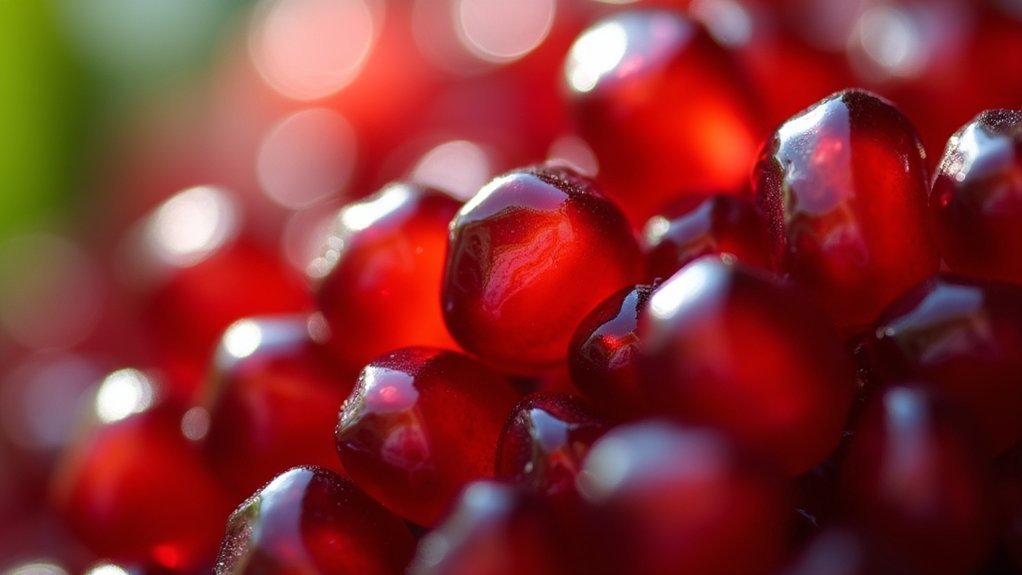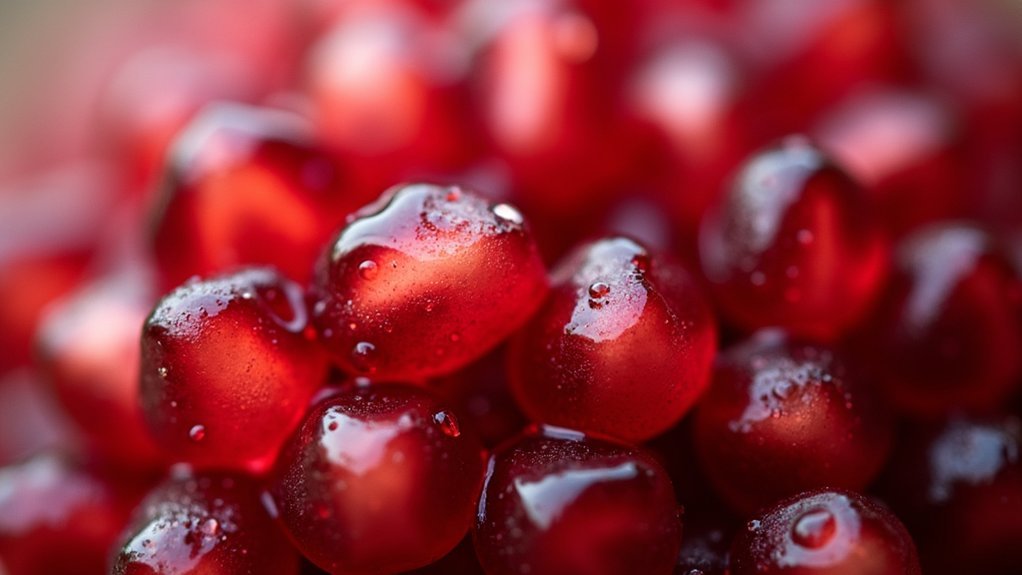Pomegranate seeds create powerful cellular protection through their rich antioxidant compounds that neutralize free radicals and preserve your cell membrane structure. You’ll benefit from ellagitannins that convert to urolithins, enhancing mitochondrial function while punicic acid targets damaged cells through ferroptosis. These seeds boost superoxide dismutase activity, reduce LDL oxidation by 20%, and maintain membrane fluidity for optimal cellular health. Choose fresh, properly stored seeds and quality ethanolic extracts to maximize their protective benefits for your cellular defense systems.
Harness Antioxidant Properties to Combat Oxidative Stress

When you consume pomegranate seeds, you’re flooding your cells with powerful phytonutrients that actively neutralize harmful free radicals and strengthen your body’s natural defense systems.
These antioxidants greatly reduce oxidative stress by inhibiting reactive oxygen species release, which are key drivers of cellular damage. You’ll enhance your body’s antioxidant capacity while maintaining the critical balance between oxidants and antioxidants.
Pomegranate seed extracts work alongside the juice to create potent protection against oxidative insults. Your cellular antioxidant defense systems become more resilient, preventing stress-induced damage that can compromise cell function. The ellagitannins in pomegranate seeds are fermented into urolithins in the colon, creating additional pathways for cellular protection.
Support Mitochondrial Function for Enhanced Cell Survival
As pomegranate seeds deliver their powerful compounds to your cells, they’re simultaneously working to optimize your mitochondrial health—the powerhouses that determine whether your cells thrive or struggle to survive.
When you consume these nutrient-dense seeds, you’re providing your body with urolithin A, which effectively removes damaged mitochondria through mitophagy stimulation.
Your cellular survival depends on these mitochondrial maintenance processes:
- Weak mitochondria removal – Urolithin A targets and eliminates dysfunctional mitochondria as effectively as NAD supplements
- Enhanced brain function – Improved mitochondrial quality supports better memory and cognitive performance
- Neurodegenerative protection – Healthy mitochondria help prevent Alzheimer’s and Parkinson’s disease progression
- Cellular energy optimization – Efficient mitochondrial function guarantees your cells maintain proper energy production for survival
Research demonstrates that pomegranate seed compounds can significantly impact mitochondrial membrane potential, indicating their direct influence on cellular powerhouse function.
Leverage Punicic Acid’s Cancer-Fighting Capabilities

Beyond supporting your cellular powerhouses, pomegranate seeds deliver punicic acid—a potent conjugated linolenic acid that specifically targets cancer cells through multiple attack mechanisms.
This compound triggers ferroptosis, an iron-dependent cell death that’s distinct from traditional apoptosis pathways. You’ll benefit from punicic acid’s ability to induce lipid peroxidation within cancer cells, disrupting their survival mechanisms while leaving healthy cells unharmed.
Research shows punicic acid markedly inhibits breast cancer cell proliferation, particularly in MCF-7 and MDA-MB-435 cell lines. It works by disrupting mitochondrial membrane potential and activating protein kinase C pathways. Studies demonstrate that punicic acid achieves approximately 50% reduction in viable cancer cell numbers at concentrations of 10 and 50 µg/ml after 72 hours of treatment.
Laboratory studies demonstrate punicic acid’s remarkable ability to halt breast cancer cell growth by targeting mitochondrial function and cellular signaling pathways.
When you consume pomegranate seeds, you’re also getting enhanced antioxidant gene expression through elevated peroxiredoxin levels, creating a dual defense that both prevents cancer formation and eliminates existing malignant cells.
Maintain Cell Membrane Integrity Through Natural Protection
Your cell membranes face constant threat from free radicals that can damage their delicate lipid structure and compromise your cellular defenses.
Pomegranate seeds’ potent antioxidants create a protective shield around these crucial barriers, neutralizing oxidative stress before it can weaken membrane integrity. These antioxidants help preserve the critical phospholipid bilayer structure that forms the foundation of every cell membrane.
You’ll strengthen your cells’ natural armor while preserving the selective permeability that keeps harmful substances out and essential nutrients in.
Antioxidant Membrane Defense
When your cells face constant bombardment from free radicals and oxidative stress, pomegranate seeds provide a powerful defense system that protects your cellular membranes from damage.
The seed oil acts as a cellular shield, scavenging reactive oxygen species before they can attack your membrane lipids and cause peroxidation. These bioactive compounds contain anti-inflammatory properties that work alongside antioxidant mechanisms to protect cellular structures.
Your cells benefit from pomegranate seeds through:
- Enhanced antioxidant enzyme activity – Superoxide dismutase (SOD) gets restored to defend membrane structures
- Increased glutathione levels – Your intracellular reduced glutathione (GSH) rises, strengthening antioxidant defenses
- Improved cell viability – Protection against hydrogen peroxide and other oxidative agents keeps cells functioning
- Preserved membrane structure – Reduced lipid peroxidation maintains membrane integrity and prevents cellular content leakage
This thorough antioxidant protection maintains your cellular redox balance.
Oxidative Stress Reduction
As oxidative stress attacks your body’s cellular infrastructure daily, pomegranate’s powerful polyphenols, anthocyanins, and ellagitannins work systematically to neutralize reactive oxygen species before they compromise your cell membrane integrity.
These antioxidants directly donate hydrogen atoms to free radicals, preventing cellular damage while boosting your endogenous antioxidant enzyme systems. You’ll experience measurable improvements in oxidative stress biomarkers when consuming pomegranate regularly.
Studies show your serum paraoxonase activity increases by 20%, while LDL oxidation drops dramatically. Your mitochondrial membranes, particularly vulnerable to oxidative damage, receive enhanced protection that maintains cellular energy production. Research demonstrates that pomegranate extract significantly increases antioxidant enzyme expression in keratinocytes, providing direct cellular protection against oxidative damage.
This thorough defense mechanism helps prevent chronic diseases like atherosclerosis and diabetes by downregulating oxidative-sensitive genes while preserving membrane fluidity and functionality throughout your body’s tissues.
Cellular Integrity Preservation
Beyond neutralizing free radicals, pomegranate’s bioactive compounds directly fortify your cell membranes against structural damage and deterioration.
These polyphenolic compounds work alongside your body’s natural membrane repair mechanisms to maintain cellular integrity. Membrane damage can trigger calcium influx that activates specialized repair proteins to restore cellular function.
Your cell membranes rely on specific structural components for peak function:
- Phospholipid bilayer stability – Pomegranate compounds help preserve the membrane’s foundational structure.
- Controlled permeability – Enhanced barrier function prevents unwanted substance leakage while maintaining nutrient exchange.
- Membrane fluidity regulation – Works synergistically with cholesterol to enhance membrane flexibility.
- Repair mechanism support – Assists your cells’ natural ESCRT-III mediated sealing processes.
This protection guarantees your cellular homeostasis remains intact, supporting essential physiological processes like nutrient uptake and waste removal while preventing membrane-related pathological conditions.
Boost Cardiovascular Health With Pomegranate Seed Oil
Your cardiovascular system receives powerful protection when you incorporate pomegranate seed oil into your routine, as its potent antioxidants actively combat LDL cholesterol oxidation and reduce atherosclerosis development.
The oil’s cardioprotective compounds work at the cellular level to enhance endothelial function while strengthening cell membranes against oxidative damage. Research demonstrates that pomegranate extract consumption leads to significant decreases in both systolic and diastolic blood pressure within just 28 days.
You’ll experience improved blood pressure regulation and reduced arterial inflammation as the oil’s polyphenols support both vascular health and overall cell viability throughout your circulatory system.
Cardioprotective Oil Benefits
When cardiovascular disease threatens millions worldwide, pomegranate seed oil emerges as a powerful natural ally for heart protection.
You’ll benefit from its antioxidant polyphenols that reduce oxidative stress on heart tissue while lowering blood pressure through angiotensin-converting enzyme inhibition. The oil’s punicic acid delivers antiatherogenic properties, reducing plaque buildup in your blood vessels.
Clinical evidence shows remarkable cardiovascular improvements:
- Arterial Health Enhancement – Decreases carotid artery intima-media thickness by 30% after one year
- Blood Flow Optimization – Inhibits platelet aggregation, reducing clot formation and heart attack risk
- Lipid Profile Improvement – Reduces serum triglycerides and increases beneficial PON1 enzyme activity
- Inflammation Control – Decreases chronic inflammation markers while supporting arterial flexibility. Research indicates that pomegranate juice can reduce inflammation markers associated with heart disease, type 2 diabetes, and cancer.
You’ll experience extensive cardiovascular protection addressing multiple risk factors simultaneously.
Enhanced Cell Viability
At the cellular level, pomegranate seed oil transforms your cardiovascular system by enhancing cell viability through powerful membrane protection and improved circulation. You’ll experience reduced oxidative stress as antioxidants shield your cellular membranes from free radical damage. The oil’s anti-inflammatory compounds actively combat inflammation that threatens cellular tissues.
| Benefit | Mechanism | Result |
|---|---|---|
| Oxidative Protection | Antioxidant polyphenols | Membrane integrity |
| Circulation Enhancement | Improved blood flow | Better oxygen delivery |
| Inflammation Reduction | Anti-inflammatory compounds | Tissue preservation |
Your cells receive enhanced oxygen delivery through improved blood circulation, while punicic acid and other bioactive compounds maintain membrane fluidity. The oil’s rich content of phytochemicals and fatty acids helps lower cholesterol levels while increasing beneficial HDL cholesterol. This extensive cellular support doesn’t just protect individual cells—it creates a foundation for ideal cardiovascular function that benefits your entire circulatory system.
Reduce Reactive Oxygen Species Production Naturally

While pomegranate seeds offer powerful antioxidant protection, you’ll maximize their benefits by adopting complementary strategies that naturally reduce reactive oxygen species (ROS) production throughout your body.
Your cellular defense system works more effectively when you support it holistically:
- Limit environmental oxidants – Minimize exposure to tobacco smoke, air pollution, and UV radiation that generate harmful ROS in your tissues.
- Choose antioxidant-rich foods – Include blueberries, dark leafy greens, and nuts alongside pomegranate seeds to provide diverse phytonutrients that combat oxidative stress. Glutathione naturally produced by your cells serves as one of your most important protective mechanisms against ROS damage.
- Support membrane protection – Guarantee adequate vitamin E and C intake to prevent lipid peroxidation and regenerate antioxidant capacity.
- Enhance endogenous defenses – Regular exercise and stress management activate your body’s natural antioxidant enzyme systems, reducing overall oxidative burden.
Enhance Superoxide Dismutase Activity for Better Defense
Your body’s superoxide dismutase (SOD) enzymes work as frontline defenders against harmful superoxide radicals, converting them into manageable oxygen and hydrogen peroxide through precise restoration mechanisms.
When you consume pomegranate seeds, you’re enhancing your cellular antioxidant defense systems by boosting SOD activity levels throughout vulnerable tissues like your heart and kidneys.
This enhanced enzymatic protection creates a powerful shield that safeguards your cells from oxidative damage while strengthening your body’s natural defense networks. Research shows that pomegranate peel extract works alongside catalase and glutathione peroxidase to provide comprehensive antioxidant protection in metabolic conditions.
SOD Restoration Mechanism
When free radicals attack your cells, superoxide dismutase (SOD) serves as your body’s primary defense enzyme, converting harmful superoxide molecules into less dangerous hydrogen peroxide and oxygen.
Pomegranate seeds contain bioactive compounds that enhance this vital restoration mechanism, strengthening your cellular defense system.
The restoration process works through several key mechanisms:
- Punicalagins and ellagic acid directly support SOD enzyme function, improving its efficiency in neutralizing reactive oxygen species.
- Flavonoids and phenolic acids create synergistic effects that amplify SOD’s protective capabilities.
- Enhanced mitochondrial protection occurs as restored SOD activity reduces oxidative stress within cellular powerhouses. The deep purplish-red color of quality pomegranates indicates optimal concentration of these protective compounds.
- DNA integrity maintenance results from improved SOD function, preventing oxidative damage to genetic material.
This restoration mechanism helps maintain cellular health and supports your body’s natural antioxidant defense network.
Antioxidant Defense Enhancement
Beyond simply restoring SOD function, pomegranate seeds amplify your body’s entire antioxidant defense network through a sophisticated enhancement mechanism. You’ll experience increased superoxide dismutase activity that neutralizes harmful superoxide anions before they damage your cellular structures. The polyphenolic compounds work synergistically with your existing antioxidant pathways, creating a powerful shield against oxidative stress.
| Defense Component | Without Pomegranate | With Pomegranate Enhancement |
|---|---|---|
| SOD Activity | Declining with age | Noticeably boosted |
| Cellular Protection | Vulnerable membranes | Fortified barriers |
| Oxidative Damage | Accumulating threat | Actively neutralized |
Your brain tissues particularly benefit from this enhanced protection, as pomegranate extracts modulate enzyme expression and activity. When you combine pomegranate with other antioxidants, you’ll maximize these protective benefits through synergistic interactions that optimize your body’s natural defense mechanisms.
Cellular Protection Benefits
Pomegranate seeds deliver their most impressive benefits at the cellular level, where they greatly boost superoxide dismutase (SOD) activity to strengthen your body’s primary defense against oxidative damage.
This enhanced SOD function catalyzes the breakdown of harmful superoxide anions into manageable oxygen and hydrogen peroxide, protecting your cellular membranes from deterioration.
The protective mechanisms work through several pathways:
- Dose-dependent enhancement – Pomegranate extracts increase SOD levels proportionally to consumption amounts
- Multi-tissue protection – Enhanced SOD activity extends across various organs, including brain tissue
- Synergistic enzyme support – SOD works alongside glutathione peroxidase for thorough cellular defense
- Metabolic stress reduction – Improved oxidative balance helps prevent metabolic syndrome development
You’ll experience reduced oxidative stress markers while maintaining ideal cellular integrity.
Maximize Nutritional Value Through Proper Preparation
Although pomegranate seeds pack impressive nutritional benefits, you’ll only reap their full potential if you handle and prepare them correctly. Choose heavy fruits with smooth, unblemished skin and refrigerate them before cutting to minimize juice loss. Extract arils carefully in a bowl of water to prevent bruising and nutrient leaching.
Store cleaned seeds in airtight containers for up to five days, avoiding excess moisture that accelerates decay. Don’t wash extracted arils unless necessary.
Eat seeds raw whenever possible, as heat diminishes antioxidants like punicalagins and flavonoids. Add them fresh to salads, yogurt, or smoothies, consuming immediately after preparation. With only 83 calories per 100g serving, pomegranate seeds provide concentrated nutrition without excessive energy density. Pair with healthy fats to boost nutrient absorption and freeze extras in single layers for long-term storage.
Understand Apoptosis Mechanisms for Targeted Health Benefits
Understanding how pomegranate bioactive compounds trigger programmed cell death reveals why these ruby-red seeds offer such powerful health protection.
You’re consuming compounds that specifically target damaged cells while preserving healthy ones through sophisticated apoptosis mechanisms.
When you eat pomegranate seeds, their polyphenols activate intrinsic apoptosis pathways in compromised cells. These compounds disrupt mitochondrial membrane barriers in damaged cells, releasing cytochrome c and triggering caspase cascades that eliminate potential threats like precancerous cells.
- Bcl-2 regulation: Pomegranate compounds modulate pro-apoptotic and anti-apoptotic protein balance
- Mitochondrial targeting: Bioactives specifically affect compromised cellular powerhouses
- Selective cytotoxicity: Healthy cells remain protected while damaged ones undergo programmed elimination
- DNA protection: Antioxidants prevent fragmentation in normal cells while promoting it in abnormal ones
This targeted cellular cleanup supports your body’s natural defense against cancer development and aging-related cellular damage. Phagocytes like macrophages efficiently recognize and engulf the targeted cells through efferocytosis, ensuring complete removal without causing inflammatory responses.
Choose Quality Ethanolic Extracts for Optimal Results
When selecting pomegranate extracts for therapeutic purposes, you’ll find that ethanolic extractions consistently deliver superior bioactive compound concentrations compared to water-based or other solvent methods.
Choose extracts prepared with 80% ethanol concentration, as this ratio maximizes phenolic and flavonoid recovery while maintaining safety standards. You’ll want products extracted using hot ethanol methods at 80°C with multiple extraction rounds, which greatly boost compound retrieval.
Opt for 80% ethanol-extracted pomegranate supplements using hot extraction methods at 80°C for maximum phenolic and flavonoid potency.
Look for extracts processed through rotary evaporation, ensuring complete solvent removal and concentrated bioactives. Quality indicators include high total phenolic content, strong DPPH scavenging activity, and consistent batch characteristics.
Verify your chosen extract’s stored in amber containers, protected from light and moisture. These extracts contain punicic acid, which makes up 74%–85% of total fatty acid content and provides significant anti-cancer properties. Avoid extracts using acetone, butanol, or hexane solvents, as they’re less effective at capturing beneficial compounds.
Frequently Asked Questions
How Many Pomegranate Seeds Should I Eat Daily for Cellular Protection?
You should eat a handful of pomegranate seeds daily for cellular protection. There’s no specific recommendation, but moderate consumption provides antioxidants and polyphenols. Consult your doctor if you’ve underlying health conditions.
Can Pomegranate Seeds Interact With My Current Medications or Supplements?
Pomegranate seeds can interact with your medications, especially blood thinners like warfarin, statins, and drugs metabolized by liver enzymes CYP2C9 and CYP2D6. You should consult your healthcare provider before adding them.
Are Pomegranate Seeds Safe for Pregnant or Breastfeeding Women?
You can safely eat pomegranate seeds during pregnancy and breastfeeding. They’ll provide antioxidants, vitamin C, and fiber that benefit you and your baby. However, you should consume them in moderation and consult your healthcare provider first.
What’s the Difference Between Fresh Seeds Versus Pomegranate Seed Supplements?
Fresh seeds provide natural fiber, vitamins, and minerals with seasonal availability, while supplements offer concentrated antioxidants, consistent dosing, and year-round convenience. You’ll get broader nutrients from fresh seeds but standardized potency from supplements.
How Long Does It Take to See Cellular Protection Benefits?
You’ll notice cellular protection benefits within 24-48 hours based on lab studies. Topical applications show results in just 12 hours, while oral supplements typically require several days to weeks for measurable systemic antioxidant effects.
In Summary
You’ve discovered pomegranate seeds’ remarkable ability to protect your cellular membranes through powerful antioxidants and punicic acid. By incorporating quality extracts into your routine, you’ll boost mitochondrial function, enhance cardiovascular health, and strengthen your body’s natural defenses. Don’t overlook proper preparation methods to maximize nutritional benefits. These tiny seeds pack serious protective power that’ll help combat oxidative stress and support your cells’ long-term health and survival.





Leave a Reply